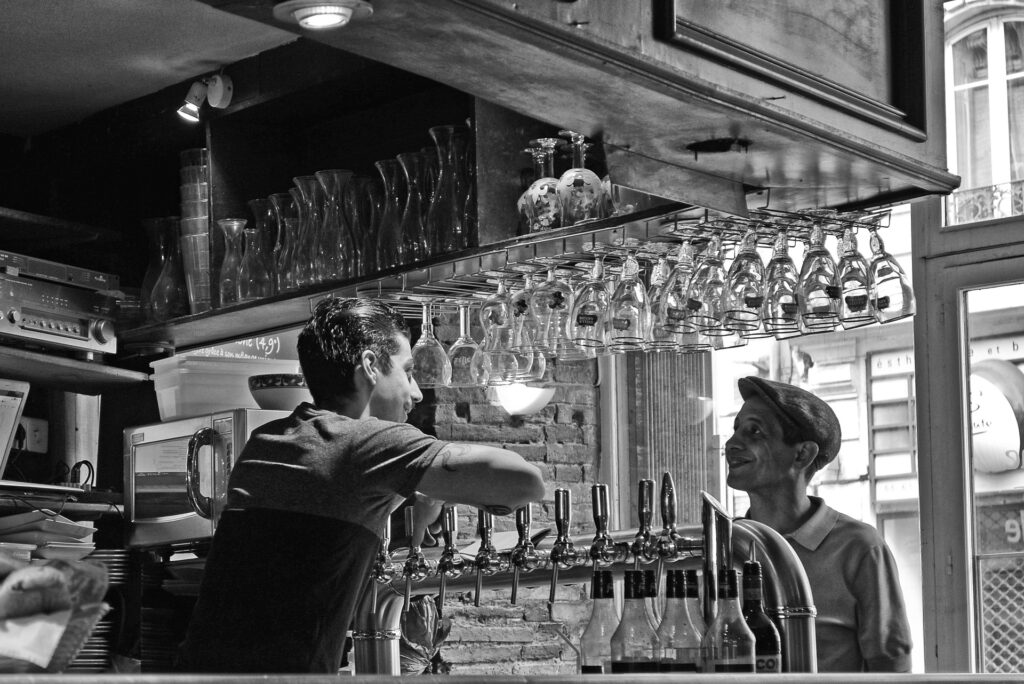
If you needed proof that we have lost our soul, just head to a bar that has lost its bartender—to a robot.
In times of loneliness, sorrow, or despair, some people go to church, and some go to a bar. Those working behind that stretch of polished wood need all the patience possessed by those hearing confessions behind a curtain. More, in fact, because the customer is not always contrite, and the drinking does not always take place in a spirit of repentance.
Weary, grizzled, gruffly compassionate, bartenders see us at our worst and forgive it. We can relax in their presence, knowing there will be no judgment, and a hangover our worst penance. In good times, we enlist them in our self-indulgence, asking them to dream up a fun cocktail or make a James Bond martini. Looped, we count on them to cut us off, maybe even order us an Uber.
But now we have Cecilia. A robotic bartender, she is being programmed to crack a few jokes, and she uses AI the way Alexa does, so she can respond to your pranks or outlandish requests in kind. Her housing is dull gray, but she is lit by a screen upon which we see an animated female barmaid. So—wait—maybe that barmaid is Cecilia, and I should not use “she” for the entire contraption. But the innards would really be Cecilia, not the two-dimensional animation, right? Or is the remote programmer really Cecilia?
Language fails. Cecilia, however, does not. She mixes each cocktail in perfect proportions—never a little heavy on the booze, to loosen you up, or lightly, when your request slurs. “She can chat to customers, and when they choose a specific cocktail, she can make it, live,” boasts Elad Kobi, chief executive of the Israeli firm, Cecilia. AI, that created this sad replacement. Cecilia will never forget the twist of lime. But neither will she give you an extra cherry because she knows you adore them.
The cocktail—so recently hailed as an artisanal triumph, its mixologists lauded like rock stars for their creativity—now pops out of a vending slot. Instead of digging out a few crumpled bills and a generous tip, you pay touchlessly—perfect adverb—by tapping your card against the screen. The advantage? Cecilia can swish up 120 cocktails an hour. That means efficiency, speedy service, more profit.
All the things that soothe you when you are heartsick.
She was released last February. On World Bartender Day. According to the BBC, “Mr Kobi believes that the traditionally change-resistant pubs and bars sector may increasingly turn to such technology in a bid to ‘wow’ customers.”
Mmm. Wow. I suspect she will fare better in the other slated destinations: hotels, airports, stadiums, casinos, and cruise ships. Places where the drink is more important than the sociability of receiving it. The traditionally change-resistant pubs and bars sector resists change for a reason. There is comfort in the familiar; like alcohol itself, it is soothing and rejuvenating. A pub is a place where you can go to be alone, yet not alone; you can find a dark snug or argue politics with strangers. We hang cheesy reproduction pub signs in our homes because they represent a century or so of conviviality, and that is something to aspire to.
Cecilia is not.
Imagine Cheers with her pulling the taps. Imagine The Simpsons with Cecilia in place of Moe.
Yet Cecilia is here, and she is not alone: Several other firms now make robot bartenders. The founder of an Estonian firm, Yanu, is Alan Adojaan, and he is sanguine about the wistfulness of customers who miss human conversation, promising that the robots will develop personalities that are more and more human.
Even now, the company website opens by telling us: “Make no mistake, Yanu has a personality, a soul even. Its spirit can be sensed when taking your order. You converse with something that is almost supernatural, yet very real.”
Very real? With a spirit that can be sensed? Marketing has taken up where theology left off. Now, instead of invoking deities, you now only need to touch a few buttons, and the products that have taken God’s place will, as Anne Sexton once wrote, “enter your hands/as easily as ten cents used to/bring forth a Coke.”
My beloved journalism professor, Avis Meyer, tended bar to pay for grad school. He saw enough that, unlike most journalists, he never drank. But from those who did, he had heard enough stories to last a lifetime—and to teach thousands of aspiring reporters how to recognize a good one.
If we pour out our hearts to Cecilia instead, we are more lost than I realized.
Read more by Jeannette Cooperman here.
